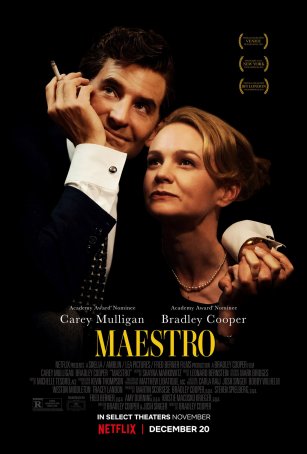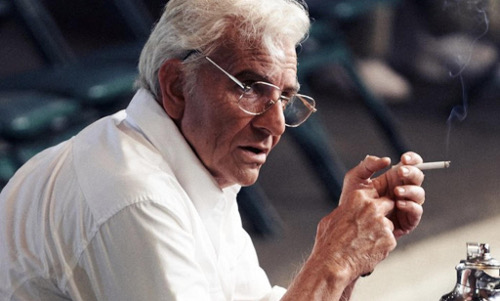Maestro (United States, 2023)
December 15, 2023
Maestro falls prey to the most common flaw of many
bio-pics: trying to encapsulate too much material (over long span of time) into
a 2-hour running time. The result is that some sequences seem rushed and
compressed, character relationships evolve erratically, and there are narrative
gaps resulting from the necessary fast-forwards. Nevertheless, despite the
limitations placed upon this approach, Bradley Cooper’s telling of Leonard Bernstein’s
life story (warts and all) contains moments of cinematic passion and poetry
that make the whole thing worth seeing, even if specific choices create an
underlying sense of frustration.
Maestro covers a whopping 45 years of Bernstein’s
life, beginning in 1943 as he conducts the New York Philharmonic for the first
time and ending in 1988 as he contemplates his own mortality but acknowledges his
continuing love for making music. The film focuses on three aspects of his
personality: Bernstein the musician, Bernstein the conflicted husband, and Bernstein
the closeted homosexual. His love and affection for his wife, actress Felicia
Montealegre (Carey Mulligan), are genuine but, although they have sex (as
evidenced by the births of three children), there’s no passion. Bernstein has
numerous dalliances with male partners. Felicia is aware of his infidelities
and tolerates them as long as he is discreet – something that’s not always the
case. When he’s composing or conducting, however, he throws himself fully into
his work.
 Cooper’s “greatest hits” approach diminishes the characters’
emotional complexity. Relationships change during the spaces between scenes and
it can be difficult to catch up. Bernstein’s feelings for Felicia are mercurial
and it can be difficult to understand why she, a proud and independent woman,
puts up with him. There are some memorable scenes – a tender scene during their
courtship, a bitter Thanksgiving Day argument, Bernstein conducting the London
Symphony Orchestra for Mahler's Symphony No. 2 "Resurrection" at the
Ely Cathedral – but the missing ingredient is the connective tissue.
Cooper’s “greatest hits” approach diminishes the characters’
emotional complexity. Relationships change during the spaces between scenes and
it can be difficult to catch up. Bernstein’s feelings for Felicia are mercurial
and it can be difficult to understand why she, a proud and independent woman,
puts up with him. There are some memorable scenes – a tender scene during their
courtship, a bitter Thanksgiving Day argument, Bernstein conducting the London
Symphony Orchestra for Mahler's Symphony No. 2 "Resurrection" at the
Ely Cathedral – but the missing ingredient is the connective tissue.
Cooper has elected to present the movie using credible facsimiles
of popular filmmaking styles of the associated eras. The early portions of Maestro,
which focus on the 1940s and early 1950s, are represented in black &
white with the “Academy” 1.33:1 aspect ratio. Actors are filmed with the gauzy,
glamorous look of the time – Carry Mulligan’s first appearance is that of a movie
star. By the late 1960s and 1970s, Cooper opts for the American indie style,
keeping the 1.33:1 aspect ratio while trading in the b&w for color. When
the timeline gets into the ‘80s, the picture expands to widescreen. It’s an
evocative and mostly effective way to move the story across the 45-year span it
encompasses.
 Maestro features two powerhouse performances and strong
support from secondary players like Sarah Silverman, Maya Hawke (looking a lot
like her mother, Uma Thurman), Matt Bomer, and Tim Rogan. As Bernstein, Cooper
has chosen to alter his appearance (using prosthetics) to closely resemble that
of the late composer. Because the makeup work is top-notch, Cooper never looks
like a man wearing a mask and the aging process seems natural. In order to
achieve maximum verisimilitude, the actor studied his subject tirelessly and
spent years working on imitative conducting. His efforts pay off in the London
Symphony Orchestra/Mahler's Symphony No. 2 "Resurrection"
performance, which was done live in one take – a 6 ½ minute scene during which
Bernstein explodes off the screen. Carrie Mulligan is somewhat hampered by the
limitations of the screenplay to bring Felicia alive but some of her scenes are
emotionally true.
Maestro features two powerhouse performances and strong
support from secondary players like Sarah Silverman, Maya Hawke (looking a lot
like her mother, Uma Thurman), Matt Bomer, and Tim Rogan. As Bernstein, Cooper
has chosen to alter his appearance (using prosthetics) to closely resemble that
of the late composer. Because the makeup work is top-notch, Cooper never looks
like a man wearing a mask and the aging process seems natural. In order to
achieve maximum verisimilitude, the actor studied his subject tirelessly and
spent years working on imitative conducting. His efforts pay off in the London
Symphony Orchestra/Mahler's Symphony No. 2 "Resurrection"
performance, which was done live in one take – a 6 ½ minute scene during which
Bernstein explodes off the screen. Carrie Mulligan is somewhat hampered by the
limitations of the screenplay to bring Felicia alive but some of her scenes are
emotionally true.
I can’t help but wonder whether Maestro might have worked better as a mini-series. The movie struggles with scope with some choices seemingly made with an understanding that the length was capped at around two hours. There’s less of Bernstein the musician than I expected. Outside of his first time conducting in 1943 and the 1973 “Resurrection” performance, his professional triumphs mostly occur off-screen so the movie can focus on his crumbling marriage and dalliances with various men. There’s plenty of good material here but also a sense that a better-tuned focus might have yielded a stronger characterization. Although not as openly crowd-pleasing as Cooper’s A Star Is Born remake, there are enough interesting touches in the film – both in its aesthetic and some of the individual scenes – to demonstrate Cooper’s evolution as a filmmaker.
Maestro (United States, 2023)
Cast: Bradley Cooper, Carey Mulligan, Matt Bomer, Sarah Silverman, Tim Rogan, Maya Hawke
Screenplay: Bradley Coooper & Josh Singer
Cinematography: Matthew Libatique
Music: Leonard Bernstein
U.S. Distributor: Netflix
U.S. Release Date: 2023-11-22
MPAA Rating: "R" (Profanity, Sexual Content, Smoking)
Genre: Drama
Subtitles: none
Theatrical Aspect Ratio: 1.33:1
- Nice Guys, The (2016)
- (There are no more better movies of Matt Bomer)
- (There are no more worst movies of Matt Bomer)
Comments